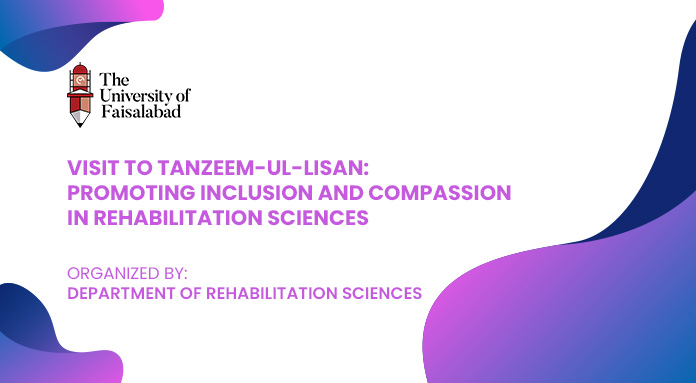Visit to Tanzeem-ul-Lisan: Promoting Inclusion and Compassion in Rehabilitation Sciences
A Path Toward Empathy and Understanding
The visit to Tanzeem-ul-Lisan by students from the University of Faisalabad’s Department of Rehabilitation Sciences marked another important step toward practical learning rooted in empathy. The purpose of this educational visit was to help students understand how real-world rehabilitation services operate, how therapy is delivered, and how emotional connection plays a vital role in patient progress.
Inside the World of Tanzeem-ul-Lisan
A Guided Look at Therapy and Support
Students were welcomed by the team at Tanzeem-ul-Lisan and introduced to their mission and range of services. The institution provides speech therapy, physiotherapy, occupational therapy, and special education support to children and adults with various disabilities.
The team explained how early intervention, structured therapy, and family involvement help improve outcomes for people facing developmental and physical challenges.
Interaction and Human Connection
Students actively participated in fun learning activities such as drawing, colouring, and simple games with the children. These moments allowed them to build emotional understanding and witness the impact of kindness firsthand. Distributing small gifts further enhanced the atmosphere of warmth and compassion.
Connection to Social Responsibility
The visit strongly aligns with the concept of Reduced Inequalities, promoting equal opportunities for individuals with special needs.
Tanzeem-ul-Lisan’s work demonstrates how community support plays an essential role in breaking social barriers. In this context, the effort reflects the broader goal of ensuring every individual, regardless of ability, has access to care, dignity, and development.
Efforts like these directly support the global mission of Reduced Inequalities, ensuring no individual is left behind. By interacting with diverse communities, students learn the importance of equal treatment and accessibility. Rehabilitation institutions that prioritize acceptance and understanding contribute to a healthier and more inclusive society. Encouraging empathy at the academic level strengthens the future workforce’s commitment to fairness and equality.
Conclusion
The visit to Tanzeem-ul-Lisan served as a real-world lesson in inclusion, empathy, and professional responsibility. It helped students understand that effective care in Rehabilitation Sciences goes beyond technical skill — it requires compassion, patience, and a strong commitment to human dignity.

